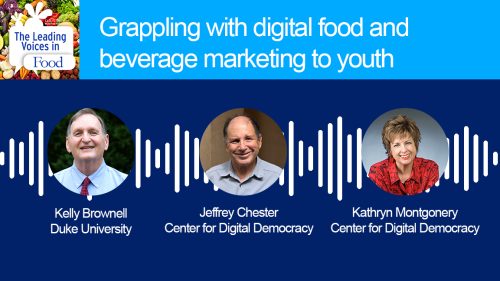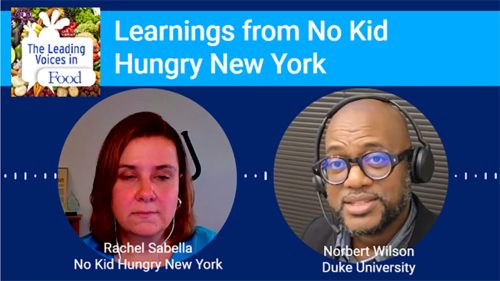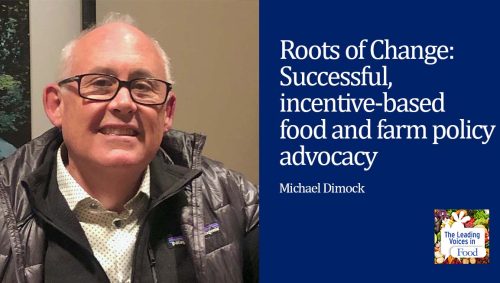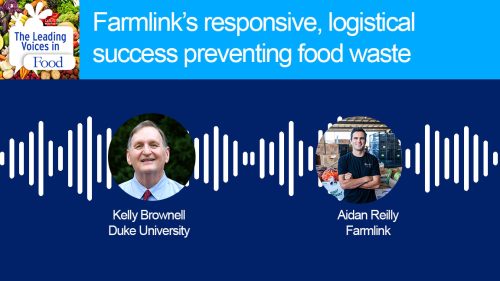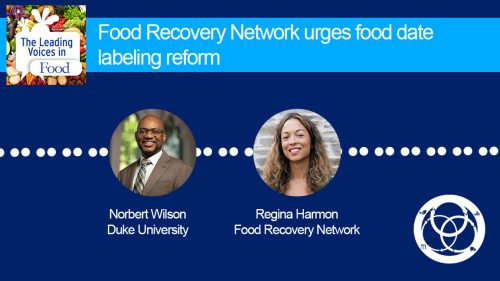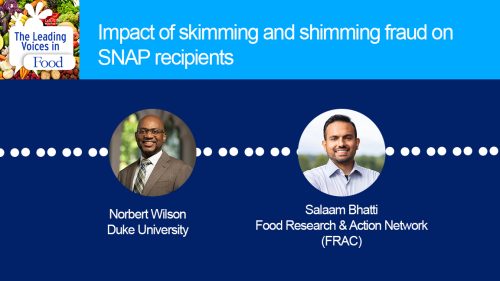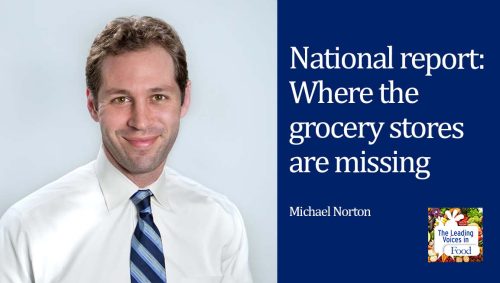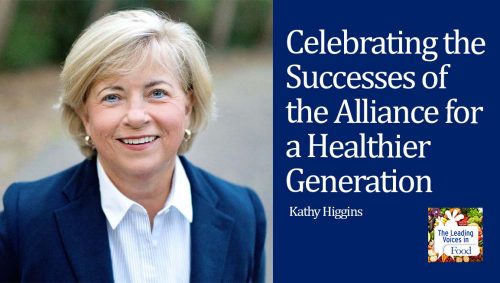The Leading Voices in Food
E263: Explore the Daily Table non profit grocery store model
Today, we’re going to explore Daily Table, an innovative non profit grocery chain dedicated to providing fresh, convenient, and nutritious food affordable to everyone, even those on the Supplemental Nutrition Assistance Program, or SNAP. In today’s economic climate, where rising food prices are impacting households across the country, the concept of a non profit grocery store seems to fill a real need. Our guest today is Daily Table CEO, Sasha Purpura, a software engineer who spent 15 years in the tech industry and product management and development roles.
Subscribe: Apple Podcasts | TuneIN | YouTube Music | SoundCloud | PocketCasts | Radio Public
Tags: Advocacy & Food | Community & Economic Development | Economics of the food system | Equity, Race & Food Justice | Food Banks, Food Pantries & Soup Kitchens | Food Insecurity | Philanthropy & Food Systems |
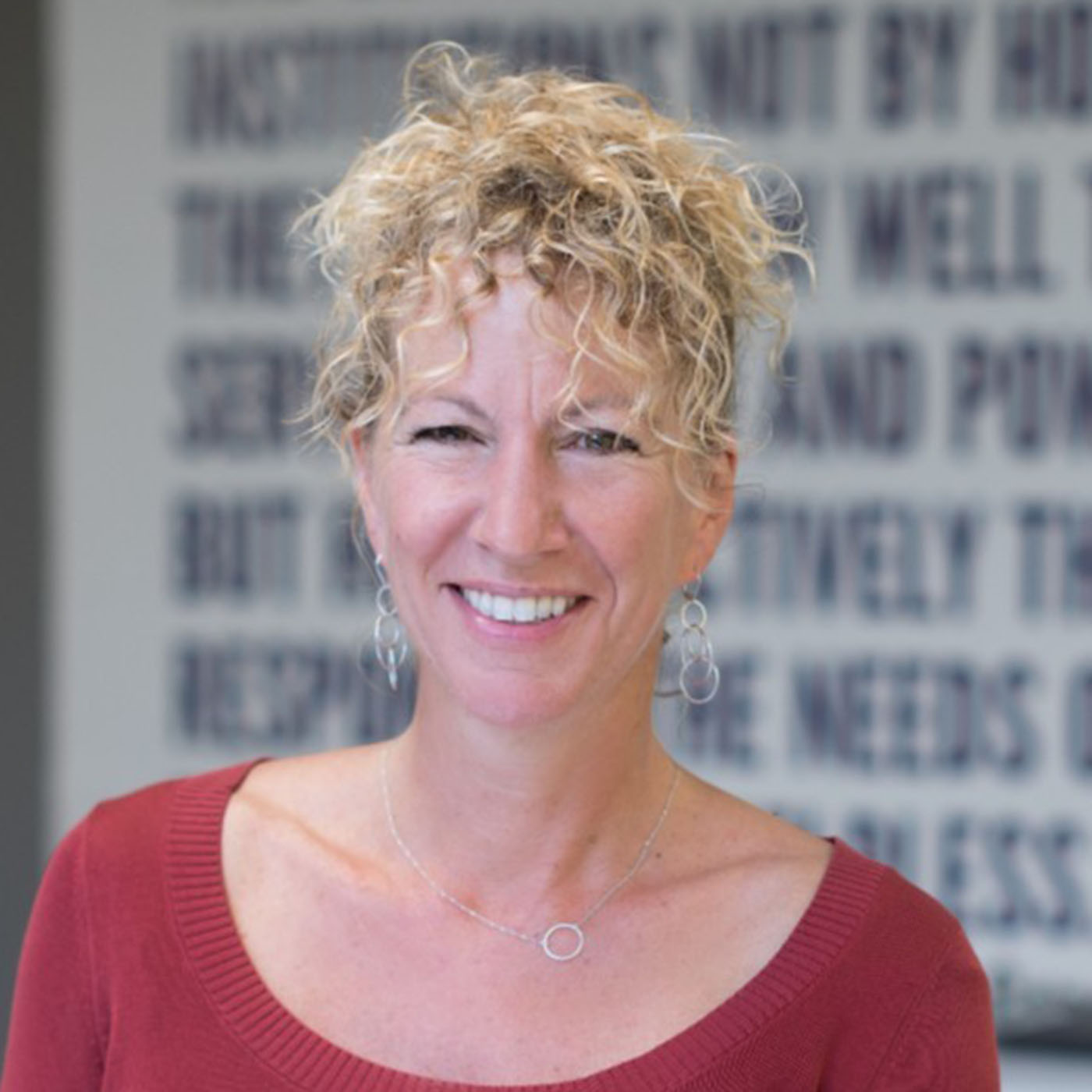
Sasha Purpura started her career as a Software Engineer and spent 15 years in the tech industry in Product Management and Management roles. In 2005, she helped her husband launch an organic farm and through that experience discovered a true passion for food and its ability to nourish not only one’s body and soul, but communities as a whole. Driven by this new passion, she left tech in 2009 and, after acquiring her MBA in Organizational Sustainability, went on to lead Food For Free. Over her 10 years as the head of the organization, she transformed it from a small, grass-roots program primarily serving Cambridge to a regional leader in food access. She has long admired Daily Table and was honored by the opportunity to join the organization as CEO in early 2024.
Interview Summary
Sasha, it is such a pleasure to connect with you. I’m intrigued to hear more about where Daily Table is today because I too was a Daily Table shopper. So, let’s begin just hearing about what Daily Table is and what’s the driving mission of the organization.
Absolutely, Norbert. Simply what’s driving the organization is the belief that everybody deserves access to healthy food. Daily Table is such a simple solution, but so incredibly innovative. It’s a grocery store where everybody can afford healthy food. To me, seems like that should be there already. Unfortunately, it isn’t.
Historically, the way we have addressed hunger in this country is food pantries. And food pantries play a critical role and they’re very necessary. However, there’s spaces designed for people with low income. To say you’re low income, you can’t afford food, come here. And we know that 40 percent of the people that qualify for food pantries won’t go to a food pantry because of that stigma. And because they want agency. They want the dignity of providing for their families and choosing what they want to eat. So Daily Table creates that shopping experience.
People who don’t use food pantries, they shop for themselves. And the sad reality is they have not been able to choose healthy food every day. They can’t. It is not affordable. If you are lower on the income scale, you cannot afford to put fruits and vegetables on your table every day. Daily Table makes it possible for every person to afford to put fruits and vegetables on their table every day.
And we are a normal grocery store. Anybody can come in there. We welcome everyone. It is not set up for people with a low income. It is a shopping experience. It is bright and colorful. It is dignified, enjoyable. Let’s go look at all this beautiful produce. Daily Table dedicates a third of its footprint in each store to produce. Think about any grocery store you go into. That is not the case. We are focused on healthy, beautiful, fresh food. So, it’s produce. It’s proteins.
And then finally, we have a commissary kitchen in our Dorchester store. It serves all of our stores, and we make healthy meals. A lot of people working two jobs cannot cook for themselves. Don’t have the resources. And unfortunately, in many cases, turn to fast food, which isn’t even that affordable these days. We make a chicken meal with a big chicken leg and 2 sides starting at $2.99. We have a large garden salad for $2.99. We have smoothies. We have soups that aren’t extremely high in sodium. So, we provide healthy, tasty, prepared meals alongside fresh produce.
If you can cook it, it’s the ingredients are there. If you can’t cook it, we cook it for you. And so Daily Table, our mission and what we do every day, is ensure that healthy food is truly affordable to everybody.
This is really a useful way of hearing about what Daily Table is. As someone who used to live in Boston, I would visit the Dorchester store. And I remember all they asked is to tell us what zip code you’re from and we would go shopping.
We don’t even ask that anymore.
Oh, you don’t even ask that anymore! That is awesome. And, you know, what’s great it was easy to take my very young daughter at that time into the store and feel good about what we were getting. And my wife was like, can you believe these prices?
In a good way!
In a very good way. And so, it was always a positive experience. And it was great to know that there were people in that local community that were in the store. That were part of the staff. And it was a great place to visit. So, I’m glad to be able to connect with you on this. But I got to ask this question, how did a software engineer all of a sudden end up in a nonprofit grocery store? What happened? What drew you to this work?
Well, it wasn’t all of a sudden, but it was definitely a path. I met my husband when we were working at Nokia. I was in product management at the time. And in 2005, he quit to start an organic farm. A dream he’d always had. Went to it full time, that’s how he makes his living. And he’d always had a big garden and just been a food person and I learned through him. I’d work with him on the weekends and getting the farm started and go to farmer’s markets with him. And I, I discovered food in a way I’d never really understood it. I fell in love with it. I fell in love with the way that food creates community. I mean, it is the center of community. It’s how we show love. It’s how we come together over holidays. But to work with my husband creating this really beautiful produce, healthy, and to share that and just, just at a farmer’s market, see how people come together that don’t know each other. And ‘how do you use collard greens? Or what is this vegetable?’ It was just life. It was just life and I wanted that. So, I quit in 2009. I worked with him on the farm for a couple of years while I went back to school just to expand my network and nonprofit and other things. And in 2012, I began as an executive director of another hunger relief organization. And what was amazing, what is amazing to me, whether it’s at a food pantry or Daily Table or a farmer’s market, it is the same experience. It is people coming together around food and sharing. And it is beautiful and it, it creates healthy communities. It’s not just nourishing us physically, but that’s critical. By the way, healthy food is the cheapest form of healthcare. If we would just invest in that. But it also nourishes a community. It’s mental health. It’s sitting around the table with your family. It’s cooking. It’s not being hungry. And so, to go from the one extreme of a local organic farm in a farmer’s market that isn’t cheap. You know, my husband isn’t making money off of it. He’s not getting rich, but the food, it takes a lot to grow food.
So, to go from that experience and bringing together people who can afford farmer’s market prices and seeing that same experience in a food pantry or at Daily Table, it is, it’s about food. It’s not about money and it should be accessible to all. It is really amazing. I loved the two years on the farm and bringing access to local food to people. And to now do that to folks who otherwise simply couldn’t get access to healthy food. It’s, it’s just an incredible honor to be a part of that.
Thank you for sharing that. And thank you for sharing part of your story. I’m interested to go back to Daily Table and understand how is it different than other nonprofit organizations, especially in the food justice space? Help us to appreciate that you gave us a bit of an idea when you were talking about comparing it to food pantries. But I’d like to hear sort of more of your thoughts on that.
Well, my thoughts are not so much are how are we different, but how do we fit into the emergency food system? One of the beautiful things… I’m in Cambridge, Massachusetts, Daily Table is at Cambridge and Boston and Salem. And I’ve worked now for 12 years in this field in Northeastern United States, Massachusetts. And what I’ve discovered is there is a network of food justice, hunger relief organizations. And we are an incredibly large community of people that care about the same thing and working together. So, we need a lot of different solutions. SNAP, as you mentioned, the supplemental nutrition access program, that is hunger relief, right? That lets people have access to purchasing food. Then there’s Daily Table where you can use your SNAP benefits to buy produce. To buy very healthy food at very low prices. Then there’s a food pantry for people that perhaps don’t even have access to SNAP. They can go to a food pantry and access food, or people can shop at Daily Table and supplement what they’re buying a Daily Table at a food pantry.
We work with an organization called the Boston Area Gleaners that uses volunteers to rescue food off of farms. And has their own farm now and grows some produce that we sell at Daily Table. We work within a network of different types of food justice organizations that are serving people in different ways and meeting them where they are. We work with Fresh Truck, which is a mobile market that goes into communities with a truck with fresh produce on it, right? So, all of these things are necessary. I would say Daily Table is absolutely critical to serving all of those people who are not comfortable getting free food. The last organization I worked for was called Food for Free, and it was wonderful, and it served hundreds of thousands of people. But there are hundreds of thousands of people that are not going to take food for free and Daily Table assists folks in that way.
Yeah. I am really appreciative of the way you’ve talked about this. And sometimes I get a sense that there is competition in this space. And what you’re talking about is, no, we’re actually all part of a large network and that we’re serving different needs and that we are stronger together. Finding ways of collaborating and giving people options and in the community. I find this really encouraging. Thank you. I’m so excited to hear more about this and to think about what that means as we go beyond the Boston area. Beyond the Northeast. And talk about replication, but I don’t want to get ahead of myself. I’ve got to ask. This can’t be easy, I mean, to offer these products at the low prices that you do and the fact that they’re all nutritionally oriented. And I’m interested to learn what are the challenges of providing and doing the work that you all do at Daily Table.
There are many, but they are luckily balanced by the joys of doing the work. One of the ongoing challenges is fundraising, right? We are a nonprofit. We work with local partners, and they give us deals in many cases. Little Leaf Lettuce, this incredible hydroponic lettuce grown out of Devons Massachusetts, ensures that we can have the absolute lowest cost little leaf at our stores every day. The same stuff you could buy at Whole Foods for twice the price. So, that’s some of it, but we buy a lot of our food from a distributor, just like anybody else. And as we all know, there has been tremendous food inflation since the pandemic. And that has made our costs go through the roof. And we have not been able and not wanted to pass those costs onto our customers, so we are a nonprofit and we have to raise money. And that’s that’s part of why you feel like there may be competition, right? All of these nonprofits rely on the community. We rely on foundations. So, it is always a challenge for us to ensure we are continually investing in letting people know we’re a nonprofit. That can be hard. We’re a grocery store. We make two thirds of our revenue through store sales. That’s incredible. Every time you shop there, you’re giving to our organization. But we need to raise a third of our revenue through philanthropy. So that is an ongoing challenge. And more specifically, we have had this amazing program called Double Up Food Bucks. Which means people shopping with SNAP can get half off of produce. And it is incredible to see, as we launched that program, how much SNAP shoppers increase their produce spending. It just showed if food is affordable, people will buy it. If healthy food is affordable. Unfortunately, at the end of September, we lost funding for that program. And we had to pause it. We were able to keep it going in Cambridge, thanks to funding from the city of Cambridge. It has been devastating to our clients who have come to rely on not only low-cost vegetables, but being able to get twice as much as the dollar would normally get. Luckily, we did a GoFundMe, and we had tremendous response from people. And now the city of Boston is willing to step up and help us fund that. I’m hoping, fingers crossed, that that program relaunches in the next week or two. But that is another program that’s going to require ongoing funding. And it’s a challenge for every nonprofit, I think. I feel confident that if we get the word out about Daily Table, it’s an exciting organization to support. And what’s wonderful is you can support it by going there and getting great prices on healthy food.
I am encouraged by how you all are thinking about these challenges and how you’re finding innovative ways of expanding the work that you’re doing. And I got to say, when I was in Boston, I lived in Somerville. I was there at the grand opening of your second location. I didn’t realize that you all have expanded.
Yes. Dorchester is 2015 and then Roxbury, which you just referenced and Nubian Square opened in 2018. Then in 2021, January, I remember I was there. It was in Cambridge, and I knew I knew the founding was happening, and I was at the ribbon cutting. We all had our masks on and we were standing 6 feet apart, but Central Square Cambridge opened. And then last year in September, we opened Salem, Massachusetts, which was up on the North Shore. Our first non urban store.
I mean, you clearly have figured out how to make this work. You’re overcoming some of these challenges. But some challenges still exist because of the need to continue to fundraise. You know, I’m interested to know, where do you see Daily Table, the network of organizations, going into the future? And I’ve just got to ask, how are you thinking about expanding?
Sure. Some people don’t know, Daily Table was founded by Doug Rauch. And Doug Rauch was the former president of Trader Joe’s North America. And when Doug was at Trader Joe’s, it was a small chain on the West Coast. And Joe, the CEO, asked Doug to head out to the East Coast and see if he could get a foothold for Trader Joe’s here. And that’s what he did. And now, as many people know, Trader Joe’s is all over the country. And that is our dream of Daily Table. I mean, it is… it is needed in so many cities in Massachusetts. In every single state in this country, and in so many cities in every single one of those states. We have received outreach from throughout Massachusetts from California from Denver from Texas from Maine. And so, we absolutely believe that a Daily Table should exist everywhere across this country, deeply in Massachusetts and in other states as well. And our hope is in, you know, the not-too-distant future, to open a store outside of Massachusetts to show people this is not a Boston based thing. This is what can be a national solution. And then to over time start to expand throughout Massachusetts and throughout the country. Now, that requires funding as we know. But I think with the outpouring we’ve seen from different states and cities saying, we want this, we believe that it is possible to find that funding. And to really expand our network across the United States over the coming years and decades.



